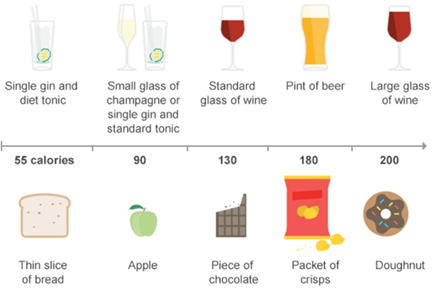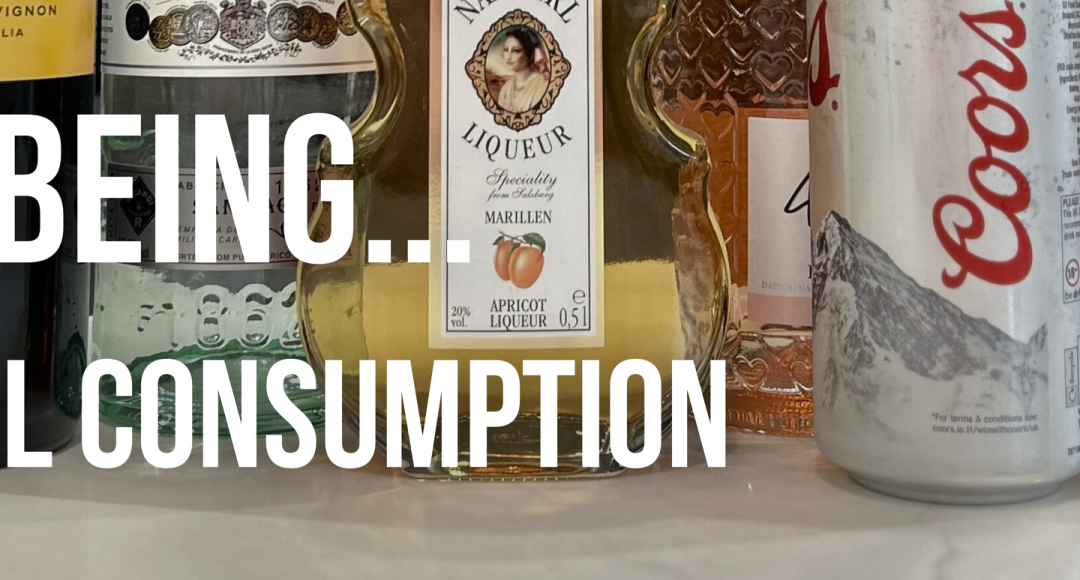Alcohol for many of us can be part of how we relax and celebrate with friends and family. As with many things though, too much is not a good thing. Hopefully, this blog will leave you feeling informed and able to continue enjoying a drink now and again without sabotaging your health and fitness goals in the process!
Whether you count your calories or not, it’s useful to remember that just because alcoholic drinks are a liquid, this doesn’t mean that they are calorie free. If your current goal is weight loss, every alcoholic drink you consume will be adding to your daily energy intake and potentially stalling your weight loss progress. The image below gives an idea of equivalent calories in foods.

credit: https://www.bbc.co.uk/news/health-29821860
Obviously, in addition to the calorie content, considering how the alcohol content of our favourite drinks affects our bodies is important too.
When we drink alcohol, it enters the digestive system. 20% ends up in the stomach and the remaining 80% is absorbed into the small intestine before ending up in the bloodstream. From there it is quickly moved around the entire body, with the majority of it ending up in the liver which on average processes 1 unit of alcohol per hour. If we continue to drink at a rate faster than that which the body can process, the alcohol remains in our blood, organs and tissues around the body for longer; if this happens on a regular basis, our immune system can become weakened and in addition, damage to our body tissues can occur. Age is also a factor here, the older we are, the longer it will take our liver to process the alcohol before moving it along to the bloodstream, thereby increasing the risk of alcohol related liver disease.

Food
Eating whilst drinking alcohol can help slow down its metabolism as it will take longer for the stomach to empty into the small intestine, it therefore also slows the rate at which alcohol is absorbed which can help us staying in control of our decision making longer.
Drinking even just a small amount of alcohol however increases your appetite and with it’s relaxing effects, it can often lead us into eating bigger quantities of foods high in fat, sugar and salt which can put us more at risk of poor health including heart disease, cancer or experiencing weight gain. Over-consumption of alcohol has the opposite effect: decreasing appetite, which over long periods of time, can contribute towards malnutrition, also leading to poor health and higher risk of experiencing heart disease for example.
Effects on exercise
When we drink alcohol, it affects our brain which negatively impacts our co-ordination, decision making, affects our emotions and reaction times and levels of self-control. Due to the time it takes for the body to process alcohol, if you hit the gym on the morning after a night of drinking alcohol, you are likely to be less effective and more likely to sustain an injury. Alcohol dehydrates us which can affect our brain by increasing our body’s sensitivity to pain for example, being dehydrated can also cause muscle cramps therefore your body will not perform to its optimal levels. Our bodies need glucose to make energy; whilst your body is still busy metabolising the alcohol in the liver, it cannot also be producing glucose effectively which will mean earlier fatigue during your workout. Drinking alcohol after a workout can also be detrimental to the anabolic processes of repairing and growing muscle stimulated by your workout.
Effects on our heart
“Red wine is good for your heart” an often shared phrase, but have you ever asked yourself why? Some research has suggested this because of the antioxidants present in some red wines; antioxidants are molecules which help our bodies repair and restore. Obviously red wine is not the only place they can be found however, they are also present in abundance in many whole foods which contain many vitamins, minerals and fibre to help support many vital functions in our bodies and don’t simultaneously cause damage to our body in the way that alcohol can.
Top takeaway points to remember:
- Alcohol is a chemical.
- Fizzy alcohol drinks can cause the alcohol to take effect more quickly due to inhalation of the bubbles in addition to drinking the liquid.
- Mixing alcohol with fruit juices will slow down its absorption, however it will also increase the amount of sugar and therefore calories consumed.
- Alcohol affects the body’s effectiveness at absorbing calcium which is key for bone density, weakened bone density puts us at a higher risk of fractures.
- The calories in alcohol are empty calories which means that they don’t provide the body with any nutrition.
Blog by Elaine Butler – Nutritional Advisor & Personal Trainer

